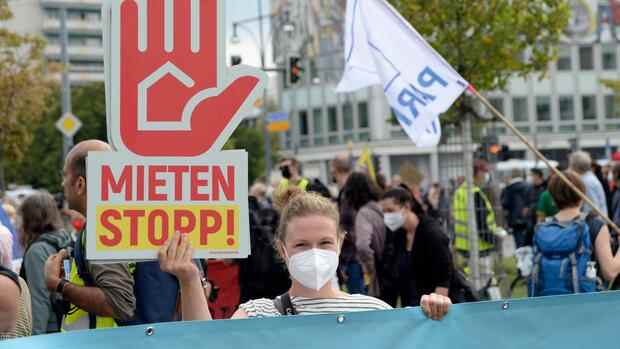The housing market is tight, especially in big cities.
(Photo: imago images/Bernd Friedel)
Berlin Considerations by the left wing of the SPD to use state intervention to protect tenants from inflation-related rent increases have met with clear criticism in the Union. “Expropriations do not create living space – on the contrary: the threat of nationalization prevents investments,” said Gitta Connemann (CDU), the federal chairwoman of the Mittelstands- und Wirtschaftsunion (MIT), the Handelsblatt.
Leading SPD politicians had previously sharply criticized Germany’s largest real estate group, Vonovia, for announcing that it would increase rents because of high inflation. “Vonovia and other real estate companies regularly show that they primarily have dollar signs in their eyes and act completely irresponsibly,” said the co-chairman of the Democratic Left Forum in the SPD, Sebastian Roloff, the Handelsblatt.
The state must intervene if the market is significantly imbalanced: “A temporary rent freeze, a municipal right of first refusal and the de-privatization of real estate groups are necessary and suitable means that are now required.” SPD leader Lars Klingbeil also accused Vonovia of ” absolutely irresponsible”.
Vonovia boss Rolf Buch had told the Handelsblatt: “If inflation is permanently at four percent, rents will have to increase accordingly every year in the future.” responded. A spokeswoman emphasized that the statements were about economic development and not about specific announcements.
Top jobs of the day
Find the best jobs now and
be notified by email.
Connemann, member of the Bundestag, stressed that renting should not turn into a loss-making business, because otherwise the situation for those looking for an apartment would worsen. This was shown by the experiences in Berlin. There, for example, the so-called rent cap was overturned by the Federal Constitutional Court in spring 2021.
“The abrupt halt to KfW funding was devastating”
The Berlin Senate had frozen the rents of most apartments and set an upper limit that determined how high rents could be. According to a study by the German Economic Institute (IW), rents fell as a result of the rent cap, but the number of apartments on offer also fell at the same time.
>> Read also: Intervention in the housing market – What Geywitz is planning for the municipal right of first refusal
Connemann emphasized: “Not deterrence, but incentive is the order of the day.” Building, letting and ownership formation must therefore become more attractive – especially for private landlords and builders. “The abrupt halt to KfW funding was therefore devastating.”
At the beginning of the year, Federal Minister of Economics Robert Habeck (Greens) prematurely stopped grants for energy-efficient construction and renovation from the KfW development bank shortly before the end of the application period due to a flood of applications and a lack of funds. After fierce protests, the applications received were still processed. It is now possible to apply for new construction funding again.
The deputy FDP chairman Wolfgang Kubicki also warned the SPD against intervention in the housing market. “We need more apartments, not more state intervention,” he told the Handelsblatt. “The nationalization of real estate groups does not create a single apartment, but only means that the scarce living space is transferred to other hands.”
The head of the SPD workers’ wing, Cansel Kiziltepe, does not share the assessment. “Housing companies are coming together without being able to explain to what extent inflation should have cost effects on existing apartments,” said the parliamentary state secretary in the Federal Ministry of Building.
The president of the Haus und Grund community of owners, Kai Warnecke, also explained that “not all cost items develop in line with inflation”. There is “no automatism” that rents will have to rise across the board if inflation is higher.
More: The crux of the heat transition – what makes the switch to climate-friendly heating systems so difficult

